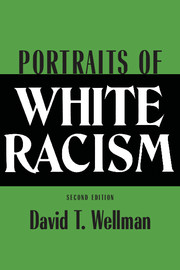Book contents
- Frontmatter
- Contents
- Preface to the second edition
- Preface to the first edition
- 1 Introduction to the second edition
- 2 Prejudiced people are not the only racists in America
- 3 From theory to research and back again – a methodological discussion
- 4 “I favor anything that doesn't affect me personally.”
- 5 “The trouble is all this suspicion between us.”
- 6 “If I could do it, why can't they do it?”
- 7 “Convincing people that this is a racist country is like selling soap – if agitators say it enough times people will believe it.”
- 8 “There wouldn't be any problems if people's heads were in the right place.”
- 9 Toward a sociology of white racism
- Epilogue: From Bensonhurst to Berkeley
- Appendix: Interview guide
- References
- Index
5 - “The trouble is all this suspicion between us.”
Published online by Cambridge University Press: 05 June 2012
- Frontmatter
- Contents
- Preface to the second edition
- Preface to the first edition
- 1 Introduction to the second edition
- 2 Prejudiced people are not the only racists in America
- 3 From theory to research and back again – a methodological discussion
- 4 “I favor anything that doesn't affect me personally.”
- 5 “The trouble is all this suspicion between us.”
- 6 “If I could do it, why can't they do it?”
- 7 “Convincing people that this is a racist country is like selling soap – if agitators say it enough times people will believe it.”
- 8 “There wouldn't be any problems if people's heads were in the right place.”
- 9 Toward a sociology of white racism
- Epilogue: From Bensonhurst to Berkeley
- Appendix: Interview guide
- References
- Index
Summary
PROLOGUE
If someone had told Hardy Frye in 1960 that he would be working on a Ph.D. in sociology eight years later, he would have looked at them in disbelief and said, “Sure man; and I suppose my father will also become a rich white man.” In his mind one was probably as likely as the other. He was living in Compton at the time, driving a truck for the U.S. Postal Service, and felt he was doing quite well for a black man who had been raised by a working-class family in Tuskegee, Alabama. His father had worked as a security guard for the thensegregated Veterans Administration hospital in town. Most of his brothers and sisters were not as well off as he. With the exception of one brother, a high school teacher, they were all doing semi-skilled work or pursuing military careers. Frye figured he was doing all right. He was steadily employed and making pretty good money.
He certainly did not look forward to driving trucks the rest of his life, and he was bitter about the racial discrimination he encountered in Los Angeles. He was also attending a school for chefs; and although he graduated third in his class, a white Hungarian refugee at the bottom of the group landed a job that was denied to Frye. Nevertheless, he figured that was life for a black man living in a white world, and working for the post office was not such a bad deal.
- Type
- Chapter
- Information
- Portraits of White Racism , pp. 116 - 140Publisher: Cambridge University PressPrint publication year: 1993

